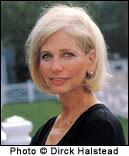Righting
the Writing -
The Politics of Prose
by Judy Bachrach
|

|
You
only have to look at the media obsessions of the past summer to realize
how far we have come. Lizzie Grubman, a bratty young woman acting out
in the Hamptons. Gary Condit, a congressman who was tried and found
guilty of murder by the press, despite a striking lack of evidence to
prove he was guilty of anything more than philandering. Psychics who
claimed to know the fate of Condit's missing girlfriend, Chandra Levy,
earnestly implored by talk show hosts, Paula Zahn most notably, to provide
ever more precise details of her whereabouts. These became, over the
course of months, the solitary interests of a famished public, its appetite
whetted -- but never quite sated - by an eternity of coverage, much
of it bad.
Nor was last summer our only plunge into the depths of dirt. One has
only to look back just a few years to the loose flailings of Paula Jones
and then the Starr investigation, to retrieve the iniquities of nonsense.
The trivial, the mendacious, the wrong-headed - all these could be found,
night and day one our television sets, in the newspapers, no supposition
too feeble to air or explore, no errors (and there were many, even in
such stories) corrected.
The media had awarded itself carte blanche, in other words. It could
lie as much as a congressman, it could pontificate as much as a president
(and some of those mini-pontificators, by the way, would have been well
advised to hang a few curtains in their own glass houses), it could
be as vicious and irresponsible as a Hamptons girl. And it could do
all this with impunity. The First Amendment, once conceived to shield
unpopular sentiments from the tyranny of government, was transformed
into an all-purpose guillotine.
I think of all this because now - ever since September - a new and much-touted
sobriety has set in, not just in the nation, but in the press. In part
this has occurred because of the hideous numbers of deaths. In part,
because the media itself is now becoming, with every packet of anthrax
mailed, almost as much of a target as the victims in the World Trade
Center. It took a nationwide tragedy to fix our drifting minds, to stabilize
our excesses. For those who look to find solace in the depths of disaster,
there is certainly some here. The press has become what it was riginally
intended to be: industrious, curious, analytical, some of its members
very brave - brave enough, for instance, to die, as a few already have
and more undoubtedly will, in this strange and relentless conflict without
borders.
But how long this respite will last is another matter. I have no doubt
the tragedies will continue, but I have serious concerns about the media
and its ability to stay the course of the new sobriety. By new sobriety,
I do not mean that all stories have to be grim, weepy and purposeful.
There will be plenty of that, in any case. But I do mean that we have
to watch ourselves carefully. Former indulgences should no longer be
tolerated, or not tolerated for long. We have created, in part because
of our own restlessness, an attention-deficit nation, hungry for stimulants,
addicted to thrills and novelty, however specious. We have to re-create,
re-examine, re-fashion the concept of what is news. And for that we
have to re-create, re-examine and re-fashion ourselves.
Judy Bachrach is a freelance writer based in Washington, DC and a
contributor to Vanity Fair. Her latest book is "Harry and Tina
come to America", the story of how Harold Evans and Tina Brown
hijacked American Journalism.
|
